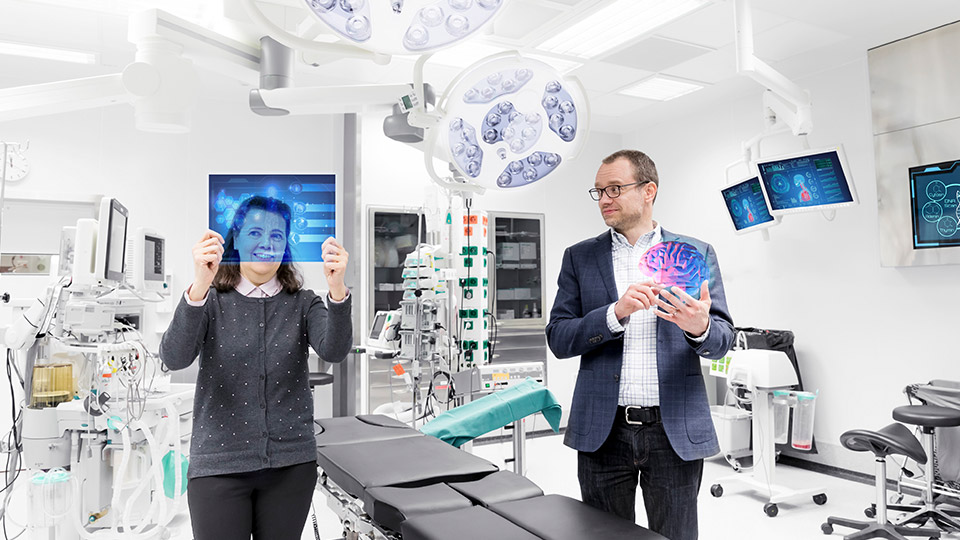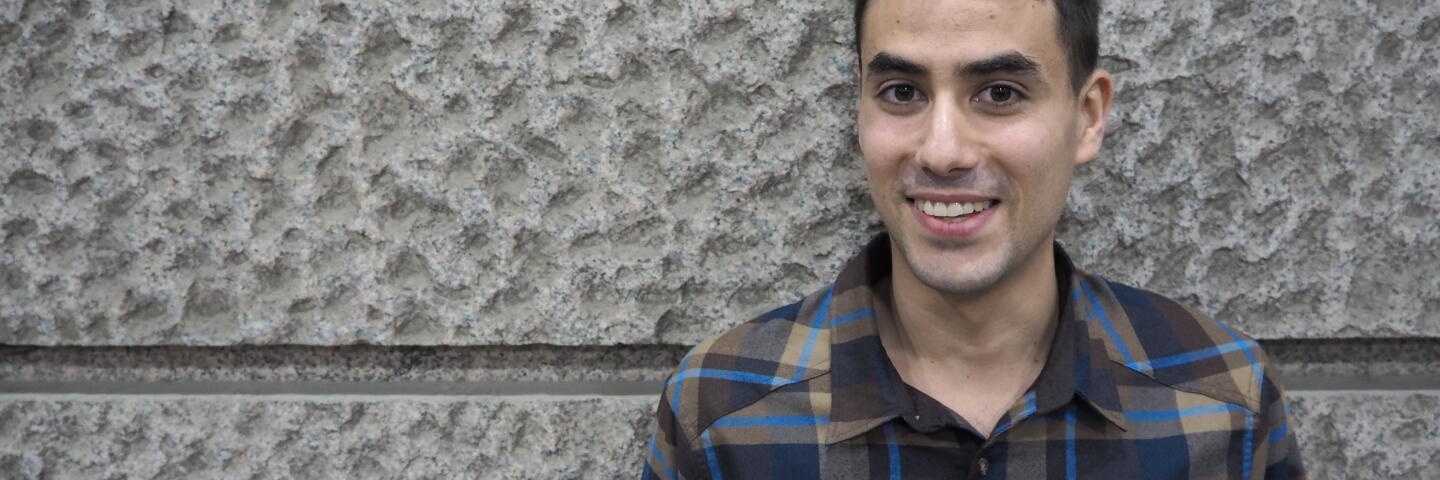Master's Degree Programme in Future Health and Technology
The Faculty of Medicine at the University of Turku has on 21 December 2021 decided to withdraw from the calls for applications for this programme starting spring 2022 and 2023 onwords. We are very sorry for any inconveniences caused to our prospective applicants.
Master´s Degree Programme in Future Health and Technology offers you a unique possibility to gain multidisciplinary and international expertise in health technology - one of the most rapidly growing fields worldwide.
The Future Health & Technology is an international, multidisciplinary Master’s degree programme organised in collaboration of two universities: Fudan University and the University of Turku, and four departments: Department of Nursing Science and Department of Future Technologies at the University of Turku; School of Nursing and School of Information Science and Technology at Fudan University. Based on the various strengths and expertise of these departments this programme will respond to future professional needs in a modern way by connecting two important educational fields: health and technology.
The Programme aims to increase understanding about knowledge, challenges, cultural diversity, and trends of information technology relevant in health care in global context. In addition, the programme obtains to strengthen the international, innovative, and interdisciplinary collaboration between information technology and nursing science. It is also designed to improve the health care information systems and the quality of care by jointly implementing innovative information technology projects in health care.
The Master’s Degree Programme in Future Health & Technology leads to a double degree, where a part of the degree studies is completed at the Fudan University in Shanghai, China.

Programme in brief
The Master’s Degree Programme in Future Health & Technology consists of two years of full-time studies (120 ECTS = European Credit Transfer and Accumulation System).
The programme consists of Major studies in Nursing Science (60 ECTS) including Master’s thesis (30 ECTS), and Minor studies in Future Health & Technology (45 ECTS) including Core courses (20 ECTS) and Capstone project (15 ECTS), as well as Elective studies (15 ECTS).
The Future Health & Technology programme is a two year full-time Master’s degree programme organised in international and multidisciplinary collaboration between two universities: Fudan University and the University of Turku.
The programme is based on partner-universities’ strengths and expertise in health sciences and information technology: University of Turku, Department of Nursing Science has strong research based knowledge in clinical nursing science (children, adults and older people), in the measurement of health instrumentation and health technology as well as in health care ethics. Fudan University, School of Nursing has its strengths in systematic knowledge synthesising, interventions and evidence-based practice. These two units cover the main areas in nursing science. University of Turku, Department of the Future Technologies has a frontline expertise in health and biomedical data analysis, machine learning, language technology, software development and embedded computing. Fudan University, School of Information Science and Technology has expertise in health and biomedical electronics, embedded electronics, and in Internet of Things. Together these collaborators will cover a wide range of the area of health technology.
This unique programme aims at educating experts with vision in scientific approach in global information technology in health care. The programme consists of studies from the fields of nursing science, software engineering and information systems, giving an excellent stepping stone for students to plan, develop and implement health technology solutions and products for clinical practice and personalised health care. Adapting theoretical knowledge to implement and tune a working solution to a real-life interdisciplinary challenge in an international setting is also an essential part of these studies.
Through this Master’s degree programme and the collaboration between the two universities and four departments, it is also possible to increase high level research and scientific knowledge relevant to future healthcare systems, and to produce health technology expertise for the growing need of planning, developing, implementing and exporting health technology solutions and products in clinical practice. This Master’s degree programme will add knowledge on the applicability, usability and feasibility of the health technology applications for use in clinical practice, such as health game technology, nursing device development and information systems for health care. Research in this field will provide valuable user perspective as nursing science is interested in developing clinical practice for both the users (clients, patients) and health professionals.
A Master’s thesis is worth 30 ECTS. It is done individually in multidisciplinary teams, co-supervised by the faculty of each participating university. The aim of the thesis process is that the student is able to produce scientific knowledge independently based on a rationalised research plan. The student is also able to assess research problem(s) using applied research methods and produce relevant information to nursing science. Master’s thesis consists of thesis plan, seminars and written thesis. Thesis supervision is organised in seminars, where students present their own work and receive feedback about their advancement.
The Master’s thesis has to fulfil the requirements of both universities, Fudan University and the University of Turku.
The specific research area of the programme is Health Technology. The research aims at creating new solutions to integrate social and health care services and new solutions to support citizen’s health, self-management and care. Research can focus for example on the development and testing of technological solutions to support health and healthcare systems.
The Master’s Degree Programme in Future Health & Technology leads to a double degree. Four departments in two universities participate in the programme. The double degree presented here leads to the following degrees: Master of Health Sciences from the University of Turku, Turku Finland, and Master of Nursing Science from Fudan University, Shanghai China.
Given that the degree requirements of the home university are met, students will obtain a degree from that university. The students, who have 1) completed one semester according to the requirements of Fudan University and 2) done their Master’s thesis and Capstone project co-supervised by Fudan University and the University of Turku, will receive a degree also from the other university, provided that the degree requirements of the other university are met.
In case an individual student selected to the programme cannot, for some unforeseen reason, complete the mobility requirement, a local degree with appropriate certificate of study will be provided after fulfilling the home university degree requirements.
The main study locations are in Fudan campus in Shanghai, China and the Turku campus in Turku, Finland. The first semester is organised at Fudan University and the second at the University of Turku for all students. The third and the fourth semesters are organised at the students’ home universities (Fudan University or the University of Turku).
Career options
Master’s Degree Programme in Future Health & Technology will provide you with a high-quality and extensive expertise in nursing science and health technology.
In this programme you will
- become widely familiar with special theoretical concepts, knowledge and methods of nursing research and health informatics
- be able to produce a Master’s thesis combining nursing science with health technology
- be able to solve demanding research and innovation problems of which purposes are to develop new information, methods and applications
- have readiness in creative, scientifically justifying tasks in the fields of nursing and health technology
- be able to manage, plan, assess and develop complex, unexpected and new strategic approaches based on scientific knowledge
- have readiness to lead innovative information technology projects in health care
- be able to promote the development of nursing science, especially in the field of health technology
Additionally you will:
- learn international thinking and multicultural understanding, including good language skills
- incorporate different approaches to your studies and gain perspectives from more than one academic supervisor, have different types of study environments, teaching and learning styles
- have a chance of creating wide network and worldwide contacts
- become a new labour generation in health and technology after graduation
- benefit from international education while seeking for work
Health technology is currently one of the most rapidly growing sectors with an increasing need of planning, developing, implementing and exporting health technology solutions and products for health services, as reflected in national and international policies. However, there has been lack of education of multidisciplinary experts in the field of health technology.
Therefore there are many employment opportunities for the graduates within the public and private sectors worldwide, including:
- project managers
- experts
- developers
- planners
- coordinators.
Students can apply for doctoral studies after completion of a relevant second cycle higher education degree. The students who complete the Master’s degree programme in Future Health & Technology, graduate with the degree of Master of Health Sciences and/or Master of Nursing Science and are therefore eligible to apply the right to study doctoral degree in Finland, in Fudan or elsewhere.
Entry requirements
General Requirement
You are an eligible applicant for Master’s-level studies if
- you have a nationally recognized first cycle degree – normally a Bachelor’s degree – from an accredited institution of higher education,
- your degree corresponds to at least 180 ECTS (European credits) or to three years of full-time study,
- your degree is in a relevant field for the Master’s degree programme that you’re applying to. Please check the programme page for detailed degree requirements.
Language Requirements
Applicants must have excellent English language skills and a certificate that proves those skills. You can indicate your language skills by taking one of the internationally recognized English language tests.
Applicants must reach the minimum required test results to be considered eligible to the University of Turku. No exceptions will be made. Read more about the language requirements here.
Eligible applicants are those who have completed a Bachelor’s Degree in health sciences or nursing science. A Degree in medicine, dentistry or biomedical sciences is not considered compatible previous studies. The degree must include at least three years of studies and it should qualify the applicant to access Master-level studies in the country where the degree has been awarded. Students with more than 2 years of clinical working experiences in the health care setting have priority to be recruited in this program.
Please note that supplementary studies (maximum 60 ECTS) may be required for the formally eligible admitted students depending on the studies they have completed during their previous degree and clinical working experience they have gained in the health care setting. These supplementary studies are additional and will not be included in the Master´s degree.
The applicants must be proficient in English.
Note that due to the regulation of The Ministry of Education of China, an applicant with Chinese nationality is not able to get study right to the Fudan University, if application has been submitted through the University of Turku, Finland. Therefore, the admitted student with Chinese nationality will be awarded only a degree from the University of Turku.
The number of students to be admitted to the programme through the University of Turku, Department of Nursing Science, is a maximum of 5 students. The admission is based on the scoring criteria which are explained below. The purpose is to acquire an understanding of the applicant’s qualifications and motivation regarding the requirements of the programme. The applicants are evaluated and ranked by the admission committee of the Programme using the criteria mentioned below. If the applicant scores 0 p. in any of the components, the application will not be processed further.
The admission committee first scores the applicants according to their application (see below) and selects maximum of 20 applicants for the oral exam. If there are two applicants with the same amount of points, they will all be interviewed. The best scoring applicants will be invited via e-mail to the oral entrance exam.
The interviews will take place on week 10 and/or 11, 2021. The exam is done together with representatives from Fudan University. The exam will be organized remotely and all applicants need to use video connection. The exam is in English and the applicants are required to use only English language in their answers. If the applicant is not invited to the oral exam or not reached at the agreed interview time, the application will not be processed further. The 5 highest ranking applicants will be admitted to the Programme. If there are two applicants with the same amount of points, the points to the question number one in the oral examination are decisive. The admission committee scores the eligible applicants by following application components:
Scoring based on the application:
- Compatibility of the background studies 0-2 p. (0 p. = insufficient, 1 p. = sufficient relevance, 2 p. = good relevance)
- Previous academic success and study history 0-4 p. (0 p. = insufficient/not suitable, 1 p. = sufficient, 2 p. = good, 3 p. = very good, 4 p. = excellent.
- Motivation letter 0-4 p. (0 p. = insufficient, 1 p. = somewhat motivated, 2 p. = sufficient and well-justified motivation, 3 p = good motivation, 4 p. = excellent motivation)
Total maximum score from the application 10 points.
Scoring based on the interview 0-10 points:
The level of an accepted performance in the interview is 5 points.
Scoring on the interview is based on:
- Interview performance
- English skills during the interview
- Motivation shown during the interview
- The oral examination of the following scientific articles:
- Dowling et al. 2018. Technology Solutions to Support Care Continuity in Home Care: A Focus Group Study. National Association for Healthcare Quality.
- Mieronkoski et al. 2017. The Internet of Things for basic nursing care - A scoping review. International Journal of Nursing Studies 69, 78-90.
- Wang et al. 2019. Effects of continuous care for patient with type 2 diabetes using mobile health application: A randomised controlled trial. International Journal of Health Planning and Management 34, 1035-1035.
- Orji, R. & Moffat, K. 2018. Persuasive technology for health and wellness: State-of-the-art and emerging trends. Health Informatics Journal 24 (I), 66-91.
Total maximum score from the interview 10 p.


